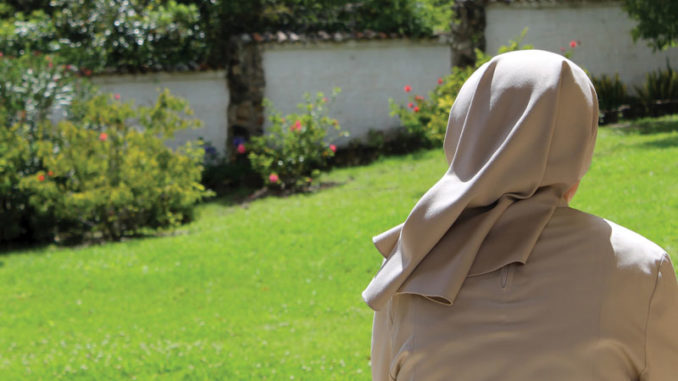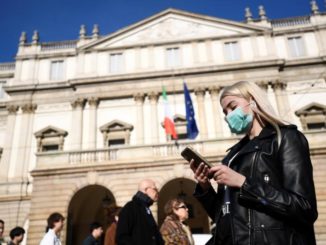
It’s been hard not to feel as though we’ve all been transported to an edgy fantasyland or a slightly earth-like but yet unearthly planet.
When we do our calculated forays to the grocery store, everyone there appears to be prepping for surgery or looks like the Frito Bandito.
On the home front, our usually respectful convent dog whines and scratches, resentful that the residents aren’t up to feed her at the customary 4:45 or 5 a.m. She also begrudges sharing her space and quiet time. We don’t exit the house saying, “Be a good girl, Angel. We’ll be back,” and head to the car. Instead, we’re here and here and here.
Ministry goes on, but after a while, email and Facebook begin to feel creepy. Talking to an actual person on the phone comes as a relief.
The plethora of webinars and Zoom meetings give us a whole new appreciation for the crafts of cinematographers and makeup artists. Who would have thought our chins would look so double and the backdrops, the walls of our kitchens or home offices, would be so off-kilter?
Distancing gets old rapidly.
I would not have expected the situation to be quite so challenging. Though I’ve done public and social things for decades, I’m a deep down introvert, bookish and appreciative of solitude. I’ve enjoyed silent retreats, even a 30-day Ignatian one, and silent meals on Good Friday at our motherhouse.
But shelter-in-place has shown me God’s wisdom in not steering me toward life in a contemplative monastery.
A month into it, I’ve joined the ranks of the stir-crazy. And that’s true even with grocery and pharmacy runs, walks around Old Town Bluffton, and lectoring at live-streamed liturgies.
The imposed limits of the pandemic have afforded me a whole new reverence for those who choose cloister for the love of God.
As I was discerning a religious vocation, I became entranced with the writings of Thomas Merton. A man who wrote poetry, was a sometime professor of literature, and caroused with artsy friends attracted me. So did his discomfort with society’s hype and the round of getting and spending.
His decision to throw it all off and enter a Trappist monastery made sense to me. He chose to stand apart and plumb Scripture, liturgy, the Church Fathers, and go on to critique his contemporaries for their proclivities toward war-making and prejudice.
In his later years, he got permission to flee the then-crowded monastery and occupy a small hermitage on the property. It seemed to open him to a wider world.
That never would have worked for me. Somehow my sense of the presence of Christ seems to require all that Merton found but also seeing the faces and exchanging some friendly words with the checkout folks at Publix, the floor swabbers at Circle K, and the people in the pews.
During these days, we’ve carried all of them in prayer, but I also miss the part of our God-seeking that is wrapped up in people-connecting. At the same time, I more and more treasure the gifts of the contemplatives among us whose single-hearted attachment to God has led them to slough off everything but simplicity.
They give us hope and point to how we find it.
First of all, they dramatize for us what it means to stake one’s life on the presence of God, even in the absence of the usual props.
Secondly, the contemplatives I’ve met also exhibit the virtues of good humor and gentle spirits. They know that ultimately Christianity is a comic religion, in the sense that Christ’s triumph assures an ultimate happy ending. Evil does not and cannot win. Tragedy — a final body count — is never the end of the story, as the Risen Lord proves.
In the meantime, we ought not only to live in grand eschatological faith and hope but also to indulge in some good old laughter.
The dean of the Greenville Deanery recently shared an online corona virus variation on The Sound of Music’s “Do Re Mi.” Friends have forwarded a carwash version of a woman bringing home groceries. Others have passed on the “Family Lockdown Boogie.”
Contemplatives know that the challenges and goings-on of our passing world do actually pass. That leads us to lightness of heart.
Engraved in stone at the gateway to Merton’s Gethsemani Abbey in Kentucky are the words “God Alone.” That isn’t a grim warning but instead a call to focus.
Our cloistered brothers and sisters know that our God is characterized by righteousness but also by a bit of irony and humor.
God knows, some of us have occupied ourselves for years with trivia. Maybe this mandatory evacuation from normality will help us see and understand that God shakes his head, but also laughs.




